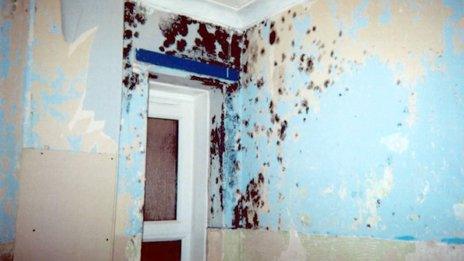Complaining tenants 'need protection from eviction'
- Published

The charities say many tenants are too afraid to complain
Tenants who complain about poor housing should be protected from "retaliatory" eviction, two charities say.
Shelter Cymru and Citizens Advice Cymru say tenants are right to fear being kicked out if they force a landlord to improve their substandard home.
They want the Welsh government to add a clause protecting such tenants in its reform of tenancy law and to give councils to power to enforce it.
The Welsh government said it would give the call "serious consideration".
The charities say their research had found plenty of examples of families and individuals who were too afraid to speak up about the shabby standard of their accommodation for fear of being threatened with eviction.
They also have evidence of people who were forced out of their home by a landlord vengeful after being made to address the problem, they said.
In a report on their findings, called Making Rights Real, they said: "We sometimes come across repeat cases of retaliatory eviction where landlords evict tenants again and again instead of addressing the disrepair problem."
The examples they give include a south Wales family who faced eviction proceedings shortly after their landlord was told by environmental health officers to fix a damp problem in the privately rented home.
The family had at first contacted the letting agent but turned to the council for help after the problem was not tackled.
'Extremely stressful'
In another case, a single mother with a baby in south east Wales complained to a letting agent that her accommodation had a number of safety problems including a utility room with no flooring and unsafe wiring that had blown several appliances.

Councils also need the power to protect private tenants who complain, say the organisations
She called in her local council's environmental health department after the letting agent did not follow up the complaint.
The agent then threatened her with eviction so, finding the situation "extremely stressful," the woman moved out.
The report says: "It is possible to introduce protection in a way that balances the interests of tenants and landlords, and does not penalise good landlords.
"On the one hand, landlords must be protected from vexatious claims by tenants.
"On the other hand, tenants need to be confident that any defence used by the landlord is genuine."
Shelter Cymru director John Puzey said: "Currently, there is no protection in law for tenants against this kind of action as there is in other countries with a similar private rented sector.
"For instance, 39 of the 50 US states have some form of retaliatory eviction statute, as do New Zealand and all six states in Australia."
'Bedroom tax'
Citizens Advice Cymru director Fran Targett said the number of homes in the private rented sector had more than doubled in ten years and more families were now using the sector for longer.
She said: "While there are advantages in a certain degree of flexibility in the market, our research and casework strongly suggests that this only works for the better-off, while people on low incomes are often forced to accept poor quality accommodation due to lack of other options."
The organisations say more people will have to rely on the private sector as welfare reform - what opponents call the "bedroom tax" - increases demand for one- and two-bedroom properties in the social rented sector.
Their research is to be presented to Housing Minister Carl Sargeant at Shelter Cymru's annual conference in Swansea.
In a statement, the Welsh government said: "Through our Renting Homes White Paper we are currently consulting on fairer and more effective arrangements for renting a home.
"We therefore welcome the research carried out by Shelter Cymru as a valuable contribution to the consultation and we will give it serious consideration, together with all other responses received."
The Welsh government consultation closes on 16 August.
- Published20 May 2013
- Published12 April 2013
- Published12 June 2012
- Published28 May 2012
- Published18 May 2012
- Published20 January 2012
- Published17 November 2011